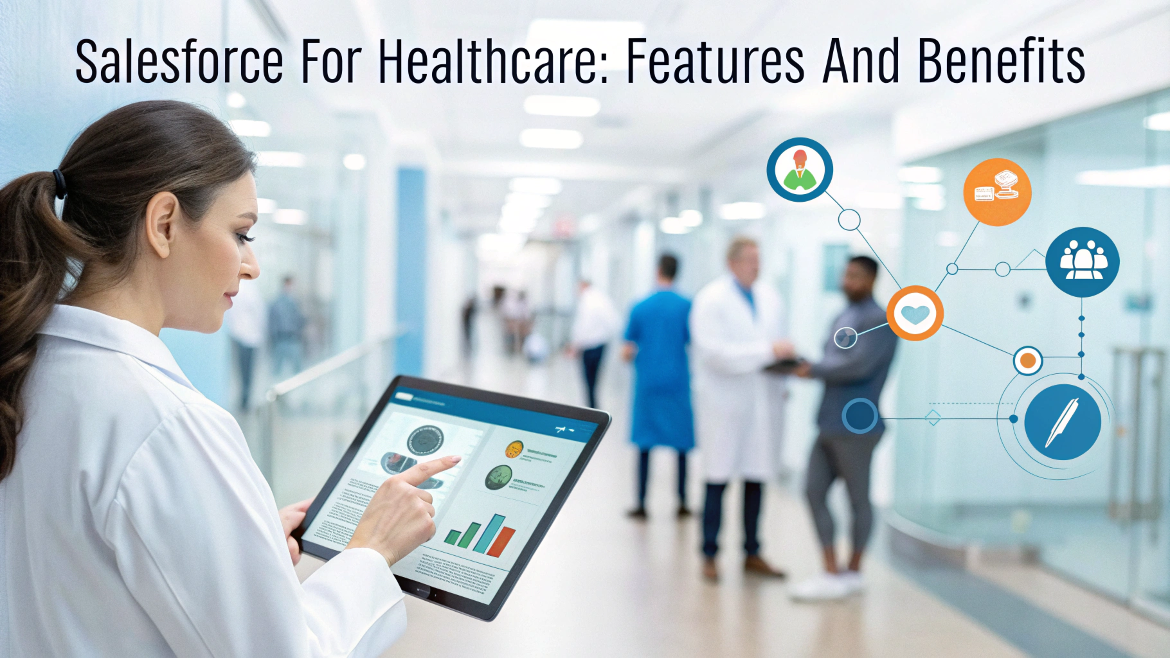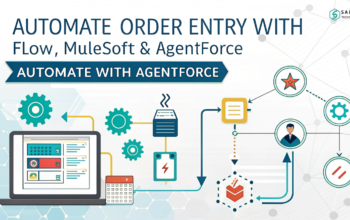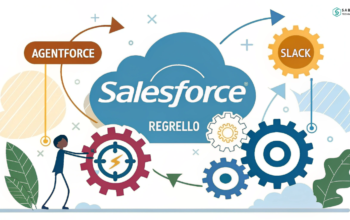Discover how Salesforce for Healthcare is revolutionizing the healthcare industry. Explore its features, benefits, and how it can improve patient care, enhance operational efficiency, and boost collaboration in healthcare organizations.
Introduction:
The healthcare industry is rapidly evolving, and with this transformation comes the need for innovative solutions that enhance patient care, improve operational efficiency, and foster collaboration across different stakeholders. Enter Salesforce for Healthcare—a powerful tool that integrates the world of customer relationship management (CRM) with the complexities of healthcare systems. Salesforce’s robust platform enables healthcare providers to streamline operations, deliver personalized experiences, and unlock new ways to engage with patients and partners. But what exactly does Salesforce bring to the table for the healthcare sector, and how can it positively impact organizations?
In this blog post, we’ll dive into the features and benefits of Salesforce for Healthcare, providing insights into why this platform is quickly becoming an indispensable asset in the healthcare space.
What is Salesforce for Healthcare?
Salesforce for Healthcare is a cloud-based CRM platform designed specifically for healthcare organizations. It empowers hospitals, healthcare providers, insurance companies, and pharmaceutical firms to deliver a more personalized, patient-centered experience. By leveraging Salesforce’s powerful data analytics, automation, and AI capabilities, healthcare organizations can improve patient outcomes, streamline operations, and foster better relationships across the entire healthcare ecosystem.
Key Features of Salesforce for Healthcare
1. Patient 360
One of Salesforce’s most remarkable features for healthcare is its “Patient 360” view. This feature provides a unified, holistic view of each patient by consolidating information from various touch points—appointments, medical history, prescriptions, test results, and more. With all this data in one place, healthcare providers can make better, more informed decisions about patient care. This feature not only enhances the quality of care but also improves patient satisfaction by ensuring that no details fall through the cracks.
2. Automation and Workflow Management
Salesforce’s workflow automation tools are game-changers in the healthcare industry. With custom workflows, healthcare organizations can automate time-consuming administrative tasks, such as appointment scheduling, follow-up reminders, billing, and referrals. Automation reduces human error, saves time, and ensures consistency across all interactions, resulting in more efficient operations and improved patient experiences.
3. AI-Powered Insights with Einstein Analytics
Salesforce’s Einstein Analytics is a powerful AI tool that helps healthcare organizations derive actionable insights from their data. By leveraging AI, healthcare providers can identify trends, predict patient needs, and optimize resource allocation. For example, predictive analytics can help hospitals anticipate patient admission volumes, reducing overcrowding and ensuring that adequate resources are available. This feature enables more data-driven decision-making that ultimately leads to better patient outcomes.
4. Collaboration Across Teams
Salesforce for Healthcare provides an integrated platform for all healthcare teams to collaborate seamlessly. With tools like Chatter, which enables internal communication and document sharing, care teams can work more effectively. From physicians and nurses to insurance representatives and pharmaceutical partners, Salesforce fosters a collaborative environment that allows for the sharing of real-time information, which is essential for delivering coordinated care.
5. Telehealth Integration
As telehealth becomes a critical part of healthcare delivery, Salesforce’s ability to integrate with telemedicine platforms is increasingly valuable. By integrating telehealth with its CRM platform, Salesforce enables healthcare providers to offer virtual consultations while maintaining a smooth flow of patient information. This ensures that healthcare providers can deliver personalized care even in remote settings.
6. Patient Engagement Tools
Patient engagement is a key focus of Salesforce for Healthcare. With features like mobile apps, self-service portals, and personalized communication, patients can take a more active role in managing their health. Whether it’s scheduling appointments, tracking progress, or communicating with healthcare providers, Salesforce’s engagement tools empower patients to access the care they need whenever and wherever they are.
Benefits of Salesforce for Healthcare
1. Improved Patient Experience
The most significant benefit of using Salesforce in healthcare is the improvement in patient experience. By consolidating patient data and offering personalized care, healthcare providers can engage with patients on a more meaningful level. This leads to better communication, more timely care, and increased patient satisfaction.
2. Enhanced Operational Efficiency
Salesforce streamlines many of the administrative processes within healthcare organizations, from patient intake to billing and follow-ups. With workflow automation, staff can focus more on patient care and less on repetitive tasks, improving overall productivity. Additionally, Salesforce’s data integration reduces the time spent searching for and updating patient information, leading to smoother operations across departments.
3. Better Care Coordination
Effective care coordination is vital for delivering quality healthcare. With Salesforce, healthcare teams can access real-time patient data and collaborate seamlessly across different departments and organizations. This eliminates communication gaps and reduces the chances of errors, ensuring that patients receive comprehensive, coordinated care.
4. Increased Revenue and Cost Efficiency
By improving operational efficiency and patient outcomes, Salesforce for Healthcare can have a direct impact on an organization’s bottom line. Reduced administrative costs, improved billing processes, and more effective resource management lead to higher revenue generation. Additionally, predictive analytics can help healthcare providers better manage patient flow and reduce unnecessary costs.
5. Compliance and Security
Healthcare organizations are required to adhere to strict regulations like HIPAA in the United States. Salesforce provides a secure platform that complies with these regulations, ensuring that patient data is protected. The platform’s robust security measures, including encryption and secure data storage, ensure that healthcare organizations can safely manage sensitive patient information.
Conclusion
Salesforce for Healthcare is more than just a CRM; it’s a transformative platform that enhances patient care, improves operational efficiency, and fosters collaboration across healthcare organizations. With its robust features like Patient 360, AI-powered insights, telehealth integration, and automation tools, Salesforce empowers healthcare providers to deliver more personalized, efficient, and effective care. By adopting Salesforce, healthcare organizations can stay ahead of the curve in an increasingly digital and patient-centric world.
As the healthcare industry continues to evolve, Salesforce for Healthcare will undoubtedly remain a key player in shaping the future of patient care. If your organization is looking to improve patient experience, streamline operations, and boost collaboration, Salesforce may just be the solution you need.
Explore More Articles:



